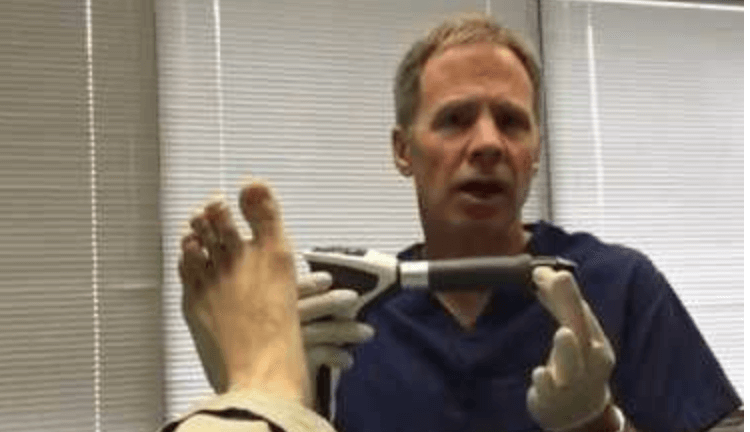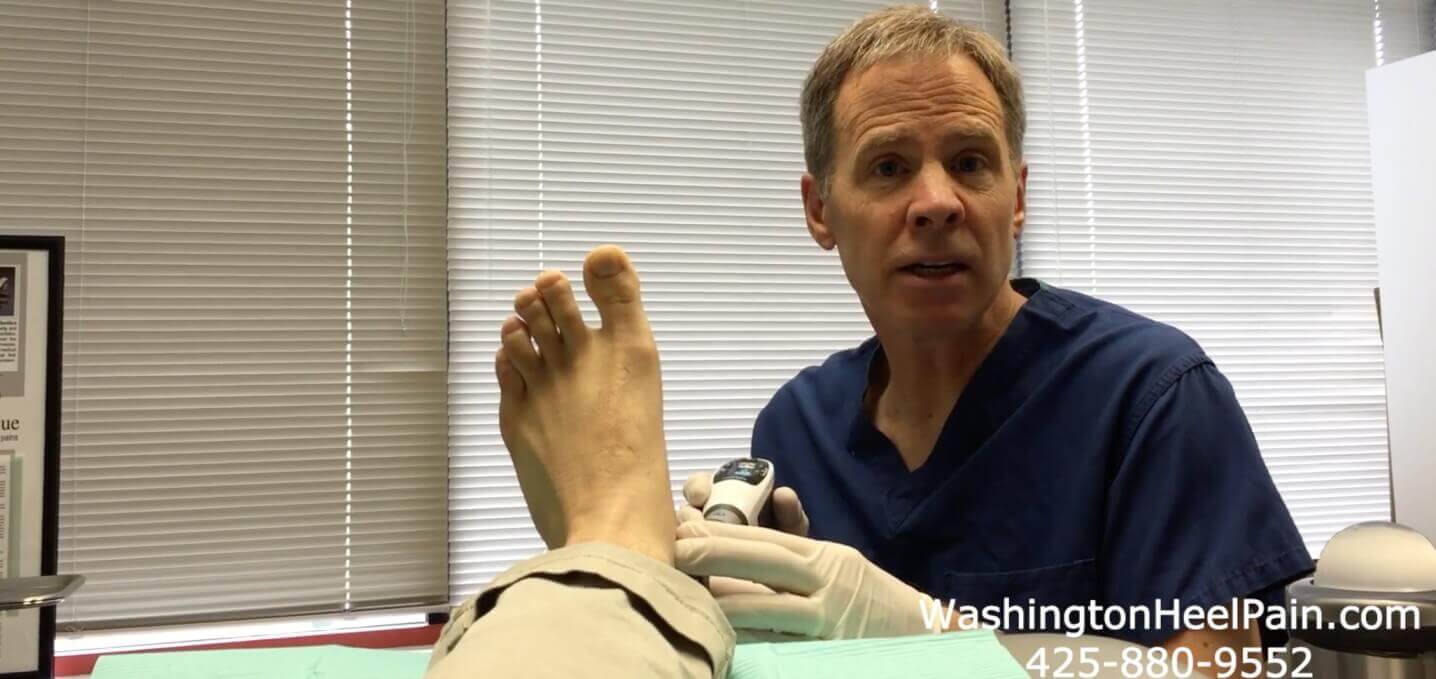shockwave therapy issaquah
Displaying items by tag: shockwave therapy issaquah
Dr. Timothy Young Discusses Shockwave Therapy for Achilles Tendonitis: A Promising Treatment Option
Introduction
Achilles tendonitis is a common and painful condition that affects the Achilles tendon, the thick cord that connects the calf muscles to the heel bone. This condition often results from overuse or repetitive stress, causing pain, swelling, and stiffness in the back of the ankle. While conservative treatments like rest, physical therapy, and anti-inflammatory medications can help manage Achilles tendonitis, some cases may require more advanced interventions. Shockwave therapy is one of the newer treatment options for resistant Achilles tendonitis.
In this blog post, I will discuss what shockwave therapy is, how it works, its benefits, and its effectiveness in treating Achilles tendonitis.
What is Shockwave Therapy?
Shockwave therapy, also known as extracorporeal shockwave therapy (ESWT), is a non-invasive medical procedure that uses high-energy acoustic waves to stimulate healing and tissue repair. Originally developed to break down kidney stones, this technology has found its place in sports medicine, offering a promising alternative for various musculoskeletal conditions, including Achilles tendonitis.
How Does Shockwave Therapy Work?
Shockwave therapy works by delivering high-energy sound waves to the affected area, creating microtrauma within the damaged tendon. This microtrauma triggers the body's natural healing response, increasing blood flow, promoting collagen production, and stimulating tissue regeneration. In the case of Achilles tendonitis, shockwave therapy targets the degenerated tissue and encourages the formation of healthy tendon fibers.
Benefits of Shockwave Therapy for Achilles Tendonitis
1. Non-Invasive: Shockwave therapy is a non-surgical and non-invasive treatment option, making it suitable for patients who want to avoid surgery or those who have not responded well to conservative treatments.
2. Reduced Pain: Many patients experience a significant reduction in pain after shockwave therapy, which can improve their overall quality of life and enable them to return to their normal activities.
3. Accelerated Healing: Shockwave therapy accelerates the natural healing process by promoting tissue repair and regeneration, allowing patients to recover faster.
4. Minimal Side Effects: Compared to surgery, shockwave therapy carries fewer risks and side effects. It generally has a much shorter recovery time and does not require a lengthy rehabilitation period.
Effectiveness of Shockwave Therapy
Numerous studies and clinical trials have examined the effectiveness of shockwave therapy for Achilles tendonitis, and the results have been promising. It is important to note that individual responses to the treatment may vary, and not all patients will experience the same level of relief.
In a typical treatment plan, patients receive multiple shockwave sessions over several weeks (typically 1X/week for 5 weeks). Each session lasts around 15-20 minutes, and most patients report improvement in pain and function after completing the recommended treatment course.
It's essential to consult with a qualified healthcare professional who can evaluate your specific condition and determine if shockwave therapy is a suitable option for you.
Conclusion
Achilles tendonitis can be a debilitating condition that hinders daily activities and sports performance. While traditional treatments have their merits, shockwave therapy offers a promising alternative for those who seek non-invasive and effective solutions.
Before considering shockwave therapy, it's crucial to consult with a healthcare provider who can assess your condition, discuss treatment options, and tailor a plan that best suits your needs. With the potential to reduce pain, accelerate healing, and improve overall quality of life, shockwave therapy may be the answer for many individuals suffering from Achilles tendonitis
If you are experiencing foot or ankle pain, give us a call today at 425-391-8666 or make an appointment online.
Dr. Timothy Young, a Board-Certified Foot Surgeon, Discusses Shockwave Therapy For Stubborn Achilles Tendinitis and Plantar Fasciitis

Dr. Timothy Young, a board-certified foot surgeon discusses, Shockwave therapy for stubborn Achilles tendinitis and plantar fasciitis. (EPAT)
Many of our plantar fasciitis and Achilles tendinitis patients respond well to traditional therapy. This includes appropriate gym shoes, prescription orthotics, braces, a night splint and stretching.
However, some patients have more stubborn cases. In these cases shockwave therapy is highly effective. In Dr Young's experience, this can be 80–90 percent effective for patients who have not had adequate relief with the traditional treatments. There are some cases that are so severe that we also use PRP (platelet rich plasma).
The shockwave therapy is typically done once a week for 5 treatments. There is no down time with shockwave therapy and there are no injections.
The Shockwave therapy protocol includes avoiding nonsteroidal anti-inflammatories like Aleve or Advil, avoiding icing, and taking supplemental boron - 3 mg per day and collagen. The clinical improvement after shockwave can continue to progress over 3-4 months.
Shockwave therapy is a form of regenerative medicine. The shockwave therapy itself is a fairly intense treatment and the targeted tissue benefits from the shockwave therapy with increased blood flow and increased local healing factors much like other forms of regenerative medicine. The body responds to shockwave therapy such that the local tissues respond as though there is trauma and this triggers many of the bodies own natural healing.
If you are experiencing foot or ankle pain, give us a call at 425-391-8666 or make an appointment online today.
Dr. Timothy Young Talks About Shockwave Therapy And How Long It Lasts

Shockwave therapy is one of the newer and most effective treatments for stubborn plantar fasciitis. It is also an excellent treatment for Achilles tendinitis and other tendon and musculoskeletal problems that we see. It is typical for shockwave therapy to be done anywhere from 3-5 treatments usually with 1-2 week intervals. The treatment results in progressive reduction in your symptoms over a period of 3–4 months from the onset of treatment. Once the treatment is complete most patients do not need additional treatment in this regard.
There are a few exceptions where a short mini series of 2 or 3 treatments may be done at 3 or 4 months from the start of treatment for exceptionally stubborn cases. For the majority of our patients that have this treatment they are pain-free and do not have recurrence of the plantar fasciitis symptoms for a period of years. It is important to keep doing proactive "maintenance such as making sure that you wear your orthotics, stretching your calf, and not going barefoot at home. Failure to do some of these treatments could result in recurrence of plantar fasciitis or reinjury.



